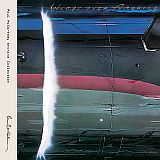
 New  |
 Wings Over America (2013 Remaster)  |
|
|
In today's Sun, Sir Paul wrote about his new classical work Ecce Cor Meum:
Ecce Cor Meum (Behold My Heart) took probably between eight to ten years to complete — but I haven’t actually counted. I was originally asked by Anthony Smith, the President of Magdalen College, Oxford. He wanted to inaugurate a new building and wanted this piece ready for that. But as time went on, I said: “I’m not sure that I’ll be ready for that” — it took longer than I thought.I was very excited by the idea. Linda and I went up there and stayed at the college. We went to the chapel, we heard the choir sing. Harmonically, it was all very interesting — I thought “Wow!” It showed me the palette of where you could go and that was how it all started.
Writing a choral piece was a huge learning curve for me because my experience is basically doing harmonies with The Beatles. The idea of formally structuring something like this and making it work was a huge undertaking. I was going at it completely raw so logistically sorting out how to go about it was a big task. But my theory was that Magdalen wouldn’t have asked me to do it if they didn’t think I could. Also, I thought about why they had asked me instead of all the other perfectly good choral composers around and I figured that it was because they must have wanted something different.
I got off to a good start and was getting quite a bit of speed on. Then about a year or so into it, Linda passed away, which immediately held things up and it went right on the back burner. Consequently I lost all momentum that I had gained in that first year and had to slowly start putting it back together. One of the ways that I did this was to just sort of write my sadness out. There is a lament in the middle called Interlude (Lament) which was very specifically grieving over Linda. I remember playing it to someone and they started welling up, which was great because I hadn’t told them that it was anything to do with Linda, but something in the chords communicated itself to this person, who was listening to it for the very first time. My colleague and I remember actually just sitting at the keyboard, just weeping while doing this piece, so it does it to me every time. It was a very emotional, very sad time for me.
Nevertheless, I got so excited about being offered this project that I didn’t think, “Do I know how to do this?” which most people would think — you know, “Can I fly a plane?” before they agree to fly one! I immediately started thinking of melodies and tunes and harmonies and I was doing this on a computer program. I learned a lot. If I set out to do another choral piece now, I wouldn’t make the same mistakes again. The good thing was that I had a preview at the Sheldonian in Oxford where we just banged up pretty much where I was up to at that point and I realized that, for instance, I was overworking the boys. A really experienced choral writer would realize that little kids, for instance, young boy trebles, can’t be given huge sustained passages because they just haven’t got the energy and stamina to handle that. These kinds of things I was just finding out as I went along, because of course I had written the piece on a computer and the computer can sing for ever without running out of breath. The boys however did run out of breath! So we had to go back and look at things again — reorganize and restructure things. These are the sorts of things that choral writers must be taught — don’t kill your choir!
The inspiration for the piece started off with just a combination of thoughts — things that interest me, things I wanted to say. It was most definitely thoughts rather than a full story from start to finish. In this very beautiful ornate church in New York, I saw a crucifix. Underneath, it said “Ecce Cor Meum” and I worked out, by dredging my mind for the Latin that I had learned at school, that it meant “Behold my heart”.
Thinking back, I can remember in the Sixties when I had written Eleanor Rigby and I was very excited by the idea that this wasn’t a band, it was actually just string players. I thought: “Wow, we can actually make a record with just strings.” I might have been in my mid-twenties at this point, and I remember thinking: “What am I gonna do when I’m 30?” Thirty seemed like the end of the world. Now, it seems like a very young age. But I had this image of myself in a tweed jacket, with patches on the elbows and a pencil and some manuscript paper, and I thought: “That’s what I will do when The Beatles runs out.” In fact, I didn’t do it until much later — I continued from The Beatles with Wings and solo stuff, but I did do it in the end.
It is something completely different. I normally write three-minute songs, which is like writing a short story. But writing a classical piece is a novel. You have to look at structure because you can’t just tack together a little bunch of short stories that don’t relate. It is just a fascinating process that I really love and it is completely different from my day job.
(kindly submitted by PLUGGED correspondent Joan M. Hopkins)
| back |
©1994-2024 Harald Gernhardt. All Rights Reserved